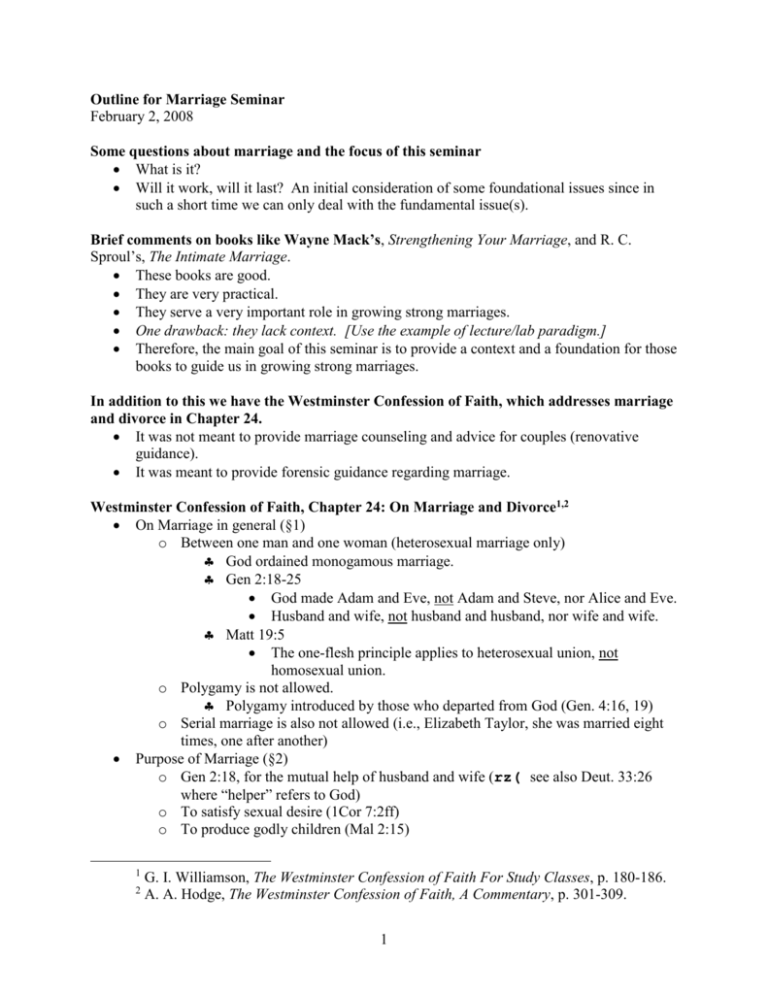Outline for Marriage Seminar
advertisement

Outline for Marriage Seminar February 2, 2008 Some questions about marriage and the focus of this seminar What is it? Will it work, will it last? An initial consideration of some foundational issues since in such a short time we can only deal with the fundamental issue(s). Brief comments on books like Wayne Mack’s, Strengthening Your Marriage, and R. C. Sproul’s, The Intimate Marriage. These books are good. They are very practical. They serve a very important role in growing strong marriages. One drawback: they lack context. [Use the example of lecture/lab paradigm.] Therefore, the main goal of this seminar is to provide a context and a foundation for those books to guide us in growing strong marriages. In addition to this we have the Westminster Confession of Faith, which addresses marriage and divorce in Chapter 24. It was not meant to provide marriage counseling and advice for couples (renovative guidance). It was meant to provide forensic guidance regarding marriage. Westminster Confession of Faith, Chapter 24: On Marriage and Divorce1,2 On Marriage in general (§1) o Between one man and one woman (heterosexual marriage only) God ordained monogamous marriage. Gen 2:18-25 God made Adam and Eve, not Adam and Steve, nor Alice and Eve. Husband and wife, not husband and husband, nor wife and wife. Matt 19:5 The one-flesh principle applies to heterosexual union, not homosexual union. o Polygamy is not allowed. Polygamy introduced by those who departed from God (Gen. 4:16, 19) o Serial marriage is also not allowed (i.e., Elizabeth Taylor, she was married eight times, one after another) Purpose of Marriage (§2) o Gen 2:18, for the mutual help of husband and wife (rz( see also Deut. 33:26 where “helper” refers to God) o To satisfy sexual desire (1Cor 7:2ff) o To produce godly children (Mal 2:15) 1 2 G. I. Williamson, The Westminster Confession of Faith For Study Classes, p. 180-186. A. A. Hodge, The Westminster Confession of Faith, A Commentary, p. 301-309. 1 o Concerning 1Cor 7:2-5, satisfying sexual desire and procreation need not be together. Who to Marry (§3 and §4) o Marriage is lawful between many kinds of people so that… Celibacy should not be imposed upon people. It is lawful for non-Christians to marry each other. Christians should marry only another Christian. True believers should not marry the ungodly (i.e., be unequally yoked, 2Cor 6:14). Also addresses issues of incest, so where incest is forbidden by divine law between people, those people are also forbidden to marry no matter if human laws may allow it. (Lev. 18:6-23; 20:10-21) Divorce (§5 and §6) o Marriage is a contract for life. Only death dissolves a marriage (Rom. 7:2-3). o A civil authority can also dissolve a marriage only by reason of adultery (Matt. 5:31-32; 19:9) willful, causeless, and incurable desertion (1Cor. 7:15). o The civil law has no other authority under God to dissolve a marriage on other grounds. That’s what the Confession basically teaches. It’s pretty straight forward, cut and dry. Any questions? But what about marital issues you may ask? What are some guiding principles for a strong marriage? Before going further, some guiding thoughts “What we believe about God determines the quality of our marriage.”3 Therefore theology is very important, because theology deals with what we believe about God. Everyone is a theologian, whether Christian or non-Christian. Even atheists are theologians. The big question is whether you are a good theologian or a bad one. Our actions, attitudes, words and thoughts about life, needs, marriage, romance, conflict, etc. reveal and reflect what we believe about God, a.k.a. our functional theology, our everyday theology. Ultimately, marriage issues stem from heart issues because our actions, attitudes, words and thoughts are products of our hearts (our inner person). Some brief words on biblical anthropology: Without getting into the particulars about body and soul and spirit (that is beyond the scope of this seminar), in general the Bible describes a person as o Inner man o Outer man 3 Dave Harvey, When Sinners Say “I Do,” p. 20. 2 Oftentimes when the Bible refers to the heart of the person the Bible is referring to the inner man. What we see and hear from the outer man is actually a reflection of the inner man. o Matt. 12:34 You brood of vipers! How can you speak good, when you are evil? For out of the abundance of the heart the mouth speaks. o Matt. 15:18 But what comes out of the mouth proceeds from the heart, and this defiles a person. o Matt. 15:19 For out of the heart come evil thoughts, murder, adultery, sexual immorality, theft, false witness, slander. o Luke 6:45 The good person out of the good treasure of his heart produces good, and the evil person out of his evil treasure produces evil, for out of the abundance of the heart his mouth speaks. The model of a tree is very instrumental in helping us understand this anthropology (Matt. 7:15ff) o Roots Our inner man. Bad roots bad fruit Good roots good fruit o Tree Our outer man. o Fruit The product of our inner man. [This is where the tree analogy breaks down…] All of this profoundly affects a marriage. And this stuff is like the first button on your shirt.4 If you get that first button wrong, the rest of the buttons don’t fit right. 4 Ibid., p. 21-22. 3 If you get that first button right, then the other buttons line up properly. So if you get this stuff right, then the other buttons like communication, responsibilities of husband and wife, sexual unity, etc. all fall into place, or almost in place. An example, communications problems: It is not just a matter of technique or communication principles. Communication problems deal with our words. Word problems are ultimately heart problems (Matt 15:18-19). Heart problems are sin problems. If we just deal with communication techniques/principles it would just make the husband and wife better sinners against each other because their heart issues have not been dealt with. One thing that is not brought that clearly, but which is implied in the WCF, is that marriage exists to glorify God. God created marriage, not just for the good of people, but first and foremost for His glory. Eph 5:22-33. o Marriage is compared to Christ’s relationship with the Church. o This relationship is supposed to bring glory to God, and so marriage is supposed to bring glory to God. Because God created marriage, marriage belongs to God. Just like language. God created language, and ultimately language exists to glorify God. Language does not belong to people to use any way we want.5 Our speech should reflect the glory of God, and likewise, our marriage should reflect the glory of God (every aspect of our marriage). God designed marriage to display His glory. “The focus of a thriving marriage is the glory of God.”6 The MAIN problem in marriage is SIN, our sin. Money, children, and sex are just the tip of the iceberg. The rest of the iceberg is SIN. The nature of sin. Look at 2Cor 5:14-15 and Rom 1:18-25. The nature of sin is two-fold: it is selfish in essence, so a. sin turns us inward toward ourselves b. sin marches me to the center of my universe, to live for myself.7 it is also idolatrous, so a. it is a matter of the heart 5 Tim Lane & Paul Tripp, Relationships A Mess Worth Making, p. 71. Ibid., p. 28. 7 Paul David Tripp, A Quest For More, p. 74-75. 6 4 b. it persuades me that life is found in what is created, than in the Creator. Sin is also ultimately against God and opposed to God. Gal. 5:17 indwelling sin (a.k.a., desires of the flesh) tries to keep you from doing the good things that you want to do. Also, James 4:1-3 these desires as well as good desires that war within us causes fights between us and our spouses. We cannot blame the other person for arguments and fights. In our marriages, the greatest problem is us, not our spouses. So what can we do regarding sin in our marriage? Applying Matt. 7:3-5 and James 4:1-2.8 Realize that we are sinners, you and I, your spouse and yourself. In humility suspect yourself first. Humble self examination. Realize and admit that circumstances only reveal existing sin. They provide the occasion for sin to show itself erupting from our hearts. See James 4:1-2. Focus on undeserved grace, instead of unmet needs. See James 4:1-2. o Undeserved grace in Christ. Our problem is revealed (sin) and solved in Christ. o Focusing on unmet needs leads to a dead end because there will always be some felt need that is not being met. Applying Luke 6:27-36 (“… be merciful even as your Father is merciful.”) “mercy doesn’t change the need to speak truth. It transforms our motivation from a desire to win battles to a desire to represent Christ.”9 What about abuse in marriages? o In cases of abuse, it would be necessary to separate the abuser from those he/she abuses. Applying mercy before sin: practicing kindness.10 Applying mercy in the midst of being sinned against: do unto others as you would like to be done to you. Applying mercy after sin: covering the offense. Applying Matt. 18:23-35 (forgiveness) We need to realize daily how greatly we have been forgiven by God through Jesus Christ. “Forgiven sinners forgive sin.”11 Dave Harvey, When Sinners Say “I Do,” p. 63-75. Ibid., p. 82. 10 Ibid., p. 84-90. 11 Ibid., p. 111. 8 9 5 Remember the grace of our Father in heaven. Approaching your spouse about sin (moving beyond self-examination): a work of grace and truth12 We need to approach our spouse like a surgeon approaching a patient. o We need much wisdom to know when to speak and how to speak. o Our spouse should know he/she needs help o Do not cut blindly, but be prepared Asked God for wisdom and insight? Am I sure about my observations or am I making assumptions? Am I only going to stick with one issue even if I’m aware of several? Am I only going to go as far as necessary instead of overdoing it? (i.e., overwhelm my spouse with a mountainous list of sinful examples, etc.) Is my goal to promote the truth of God, or my preference? (i.e., being anal retentive about maintaining order in the house). o We need courage to approach lovingly and meekly. o We need to stick with our spouse/patient even in the recovery phase of the surgery. When all is said and done, continue to remember grace, God’s grace (Titus 2:11-14). God’s grace sanctifies. A few words about sex… Again, problems with sex is mostly an indication that there are deeper sin issues between a husband and wife. While I think it would be beyond the scope of this seminar to delve more deeply into sexual problems in a marriage there are couple of principles regarding sex that should guide our thinking regarding sex: o Sexuality is designed by Christ as a way to know God more fully.13 God made us sexual beings so that there would be language and vocabulary to describe what it means to be united to our Lord in love and what it means to turn away from him. (Eze. 16:13-16; 32-33; 35-37; Eph. 5:25-27) o Knowing Christ more fully in all his infinite supremacy is designed as a way of guarding and guiding our sexuality.14 (Rom. 1:28; 1Thess. 4:3-5) Knowing Christ in his fullness as a creature can know. Knowing Christ in his awesomeness Knowing Christ in his majesty and gravity. Like having the Sun in our center holding all my planets (aspects of my life) in orbit. This knowing is not like knowing a hurricane by watching TV, but by flying into the eye of the storm.15 12 Ibid., p. 118-132. John Piper, “Sex and the Supremacy of Christ,” p. 35. 14 Ibid., p. 35. 13 6 Some final thoughts…16 There is something miraculous and celestial about a man and woman in love. Yet, it is so easily unraveled, stripped of its splendor and turned into the ordinary. Either we suffocate under all that is unbeautiful, unsurprising, ungraceful in our lives, or we learn to breath the air of grace. In marriage we learn to appreciate our spouse, to see one another as precious. In marriage we learn how to love. In marriage, our spouse becomes as close as anyone in the world can come to being what Christ is to us in the Spirit. 15 16 Ibid., p. 38. Mike Mason, The Mystery of Marriage, p. 215-217. 7 Books for further study (suggested bibliography): Harvey, Dave. When Sinners Say “I Do”. Wapwallopen, Pa.: Shepherd Press, 2007. Hodge, A. A. Hodge. The Westminster Confession, A Commentary. Carlisle, Pa.: The Banner of Truth Trust, 2002. Lane, Tim and Tripp, Paul. Relationships, A Mess Worth Making. Greensboro, N. C.: New Growth Press, 2006. Mack, Wayne. Strengthening Your Marriage. Phillipsburg, N. J.: P. & R. Publishing Co., 1977. Mason, Mike. The Mystery of Marriage. Sisters, Oregon: Multnomah Publishers, 2005. Piper, John and Taylor, Justin, ed. Sex and the Supremacy of Christ. Wheaton, Ill.: Crossway Books, 2005. Sproul, R. C. The Intimate Marriage. Phillipsburg, N. J.: P. & R. Publishing Co., 2003. Tripp, Paul David. A Quest For More. Greensboro, N. C.: New Growth Press, 2007. Williamson, G. I. The Westminster Confession of Faith For Study Classes. Philadelphia, Pa.: P. & R. Publishing Co., 1964. 8







